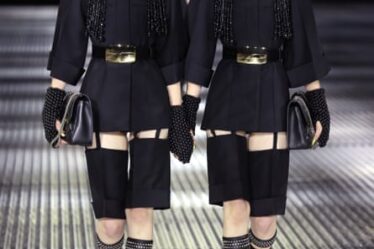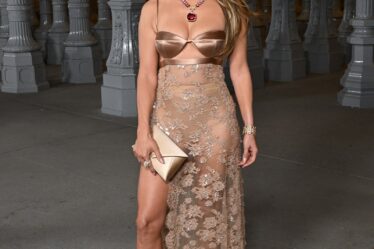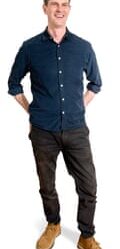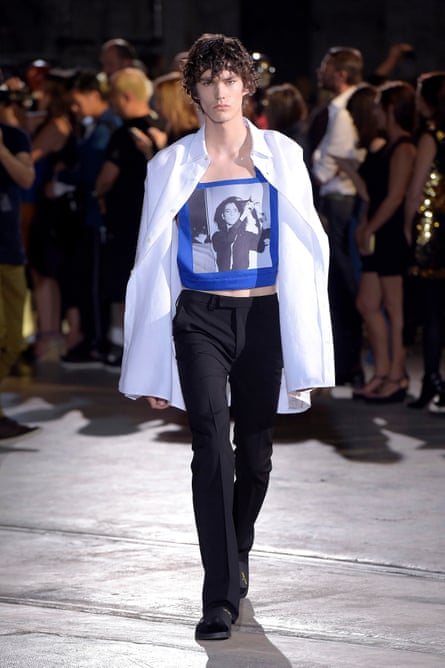
A new painting by the Scottish painter Peter Doig, titled Alpinist, is set to hang as part of a new show that opens at the Courtauld in London this week. Finished in 2022, it depicts a man wearing a riotously colourful harlequin suit, uncannily similar to the crystal-covered Egonlab jumpsuit worn by Harry Styles on this week’s Grammy awards red carpet. Their resemblance did not go unnoticed by Doig, who posted an image of Styles in the Grammys ensemble on Instagram, complete with a pair of skis and rucksack from the original painting crudely added. A fabulously knowing wink by the artist – and another excellent flip-flop between art and fashion.
From the Lucian Freud show at London’s Garden Museum, to the forthcoming Lynette Yiadom-Boakye exhibition at Guggenheim Bilbao, and the Basquiat x Warhol blockbuster opening at the Louis Vuitton Foundation in Paris in April – when it comes to reimagining the way we get dressed, there’s fashion inspiration in every gallery you look.
This collision is not new. Elsa Schiaparelli worked with Alberto Giacometti and Salvador Dali in the 1930s, and the label she founded continues to stir buzz under its current designer, Daniel Roseberry, who created Kylie Jenner’s controversial lion-head gown for Paris fashion week last month. But it’s Andy Warhol, who began his career as a fashion illustrator for Vogue, who remains the most fashiony of all from creating portraits of Halston and Giorgio Armani, to posing with Basquiat in Everlast boxing gear, to having his work appear on Versace dresses and Uniqlo T-shirts.
Doig already has fashion form, too. In 2021, he collaborated with Dior’s creative director for menswear, Kim Jones, on an autumn/winter collection. “We looked at his paintings of men, of skiers, ice-hockey players, and the night sky,” Jones told Vogue. In another collection, Jones worked with the Ghanaian artist Amoako Boafo.
When I saw Doig’s new work, it had me searching through the patterned knit section of my wardrobe, which I’d been ignoring all winter. It’s one of many artworks that celebrate the joy of clothing on canvas. Some are even a worthy rival to what you might see on the catwalks.
Take one of Yiadom-Boakye’s elegant male characters, captured in profile wearing a yolk-yellow polo-neck and tan trousers in Divine Response (2021); or Lucian Freud’s portrait of photographer Harry Diamond dressed in a slouchy khaki mackintosh, grey V-neck and unbuttoned shirt in Interior at Paddington (1951), a painting that was rediscovered following the Garden Museum’s show.
See also the late portraits of Milton Avery, such as Sally by the Sea (1962), with its beetroot-pink skirt and perky yellow top; or Frida Kahlo’s Self Portrait with Cropped Hair (1940), with its oversized suit and earring. Dressing like paintings has, it seems, a smorgasbord of possibilities.
Galleries are a great source of inspiration in an era of buying less and restyling what you already have. A pin-up for this concept is Vivienne Westwood. The late fashion designer, who made “Buy less, choose well, make it last” one of her career defining philosophies, once said: “I couldn’t design a thing without looking at art.”
In this social media-driven era, interest in fashion has exploded. But so, too, has the need for designers to have stronger narratives around their clothing. Collaborations with artists or their foundations – from Raf Simons with Robert Mapplethorpe in 2016, to Acne Studios’s partnership with the estate of Larry Stanton last year – can also create collectible pieces.
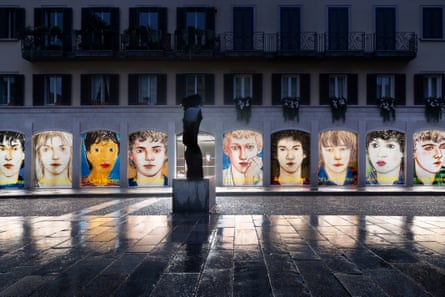
Sometimes, the influence of artists is more coincidental. Last autumn, an Alice Neel exhibition at London’s Victoria Miro gallery featured a 1947 painting of Georgie Neel, her nephew, featured Georgie wearing a deep-red crew sweater with blue pointed shirt collars worn outside the knit – a simple idea that immediately switches a look up. It also felt quite Prada – and indeed the brand’s new menswear show showcased some similar collar styling.
There are hardly any clothes in the new retrospective of Giorgio Morandi at the Estorick Collection in London, apart from some in a self-portrait. But Morandi’s work, much of it here painted in the 1940s and 50s, is more of a fashion mood. His use of colour in his still lifes of carafes and vases – butter yellow, warm tan, off-white, a plethora of grey – were surely made to be worn together.
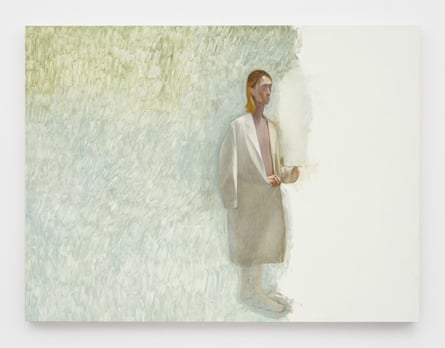
It would also be remiss to ignore Cate Blanchett’s wardrobe in Tar. Her grey shirt by Parisian brand Lemaire is very Morandi. There is also a mood here of The Row (Blanchett also wore the brand), whose Instagram is a great source of inspirational art references, such as Georgia O’Keeffe’s Blue Road, a heavenly minimal swerve of colour.
It also resonates with emerging artist Heidi Hahn’s architectural and angular women, in all their Jil Sander-like minimalism. A similar sensibility (and palette) turned up at the men’s autumn/winter 2023 Loewe show, where creative director Jonathan Anderson teamed up with up-and-coming artist Julien Nguyen. The collection was was built around a coat-shaped silhouette, worn like a dress, which echoed Nyguen’s painting Woman in a Lab Coat.
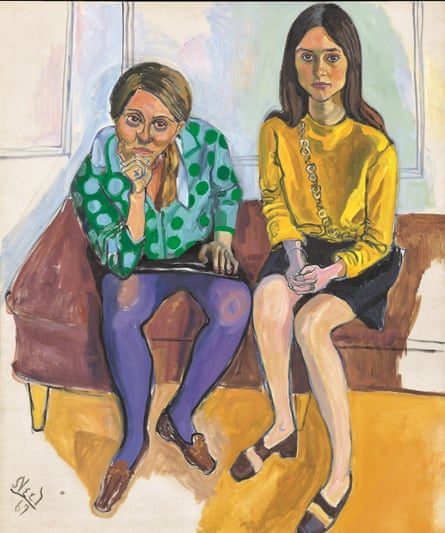
Conveniently, there is a new Alice Neel show titled Hot Off the Griddle, which opens at the Barbican in London this month, and featuring styling twists galore. In her painting titled Wellesley Girls, there are polka dots – very next-season Marni – and mini skirts. A 1977 portrait of Mary D Garrard showcases its subject seated in Neel’s trademark striped armchair, wearing a navy overcoat styled with a knitted hat, red scarf and khaki slacks. Another portrait, of Abdul Rahman (1964), similarly makes an excellent case for a double-breasted green coat with a mustardy shirt.
Like Freud, Yiadom-Boakye and Doig, Neel paints clothing with real gusto. It would seemingly be impossible for any fashion fan to not leave this show without at least one new styling takeaway.

